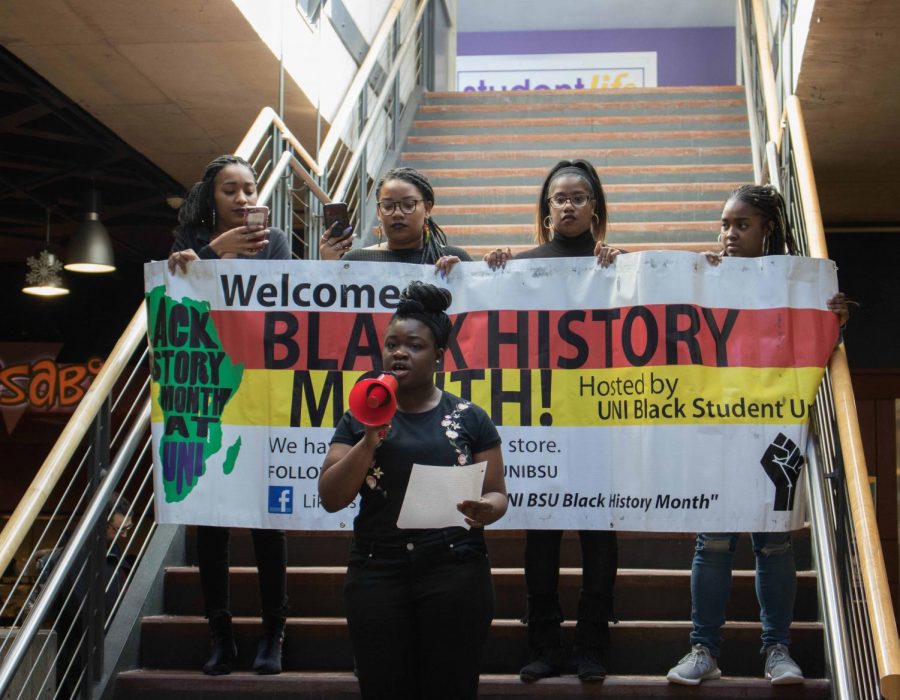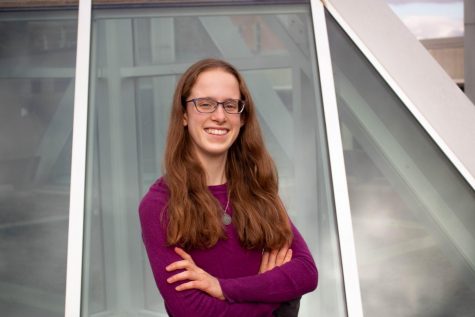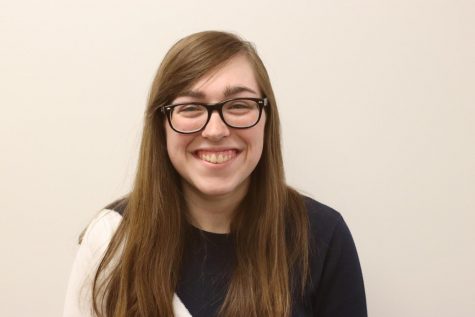BSU chats about cultural experiences
On Wednesday, Feb. 13, the Black Student Union (BSU) hosted a Brotha & Sista Chat, in which various topics and experiences were shared. BSU is hosting a variety of events in honor of Black History Month during the month of February.
Feb 18, 2019
The area in front of Chats in Maucker Union lived up to its name from 6:30-8 p.m. on Wednesday, Feb. 13, as UNI’s Black Student Union (BSU) hosted a Brotha & Sista Chat.
The event, part of BSU’s ongoing series of events for Black History Month, mimicked a speed-dating setup.
In the center of Maucker Union, 25 tables were arranged in rows, decorated with Valentine’s Day centerpieces and bags of candy. The tables also contained small slips of paper with questions covering controversial topics and experiences within the black community.
Seated at each table was a member of BSU. The empty seat opposite them was filled by interested attendees, who had the chance to discuss the questions for five minutes before rotating to the next table.
Paris Haywood, sophomore marketing major and BSU president, said that BSU wanted to incorporate a discussion-based event into its Black History Month planning.
“But we didn’t want to have a panel. We just wanted it to be more personable between two people,” said Haywood.
As the “Brotha & Sista” name implies, many of the questions were centered around romantic relationships between men and women as members of the Black community.
“We’re trying to get African American males to come talk,” said Haywood. “Some of the questions are tailored towards what they would want to ask us [as African American women] and what we would want to ask them, just to bring us closer together.”
Topics for discussion included the questions, “Why do black men often ignore their mental health issues?”, “Do you believe black women are the largest minority group?”, and “Is black love still a goal in the black community?”
Although many questions were designed for members of the black community, BSU organizers emphasized that even non-members could still benefit from the event.
“We have one designated person at each table to be the conversation starter, so even if you don’t know the answer to this question, I could educate you on it,” said freshman political science major and BSU member Ochuko Avwunuma.
One of the questions at Avwunuma’s table was: “Why don’t black women like having their hair touched?” She said that question was a good example of a topic that offered a chance for education. Those who aren’t members of the black community may not be able to contribute, but they can learn from the stories of black women like Avwunuma, who regularly has “complete strangers” touch her hair without invitation.
“To me, I’m not part of a petting zoo,” she said. “My hair is a part of me, it’s a part of my culture. You can say you like my hair and ask how I did it, but for you to then touch my hair is not appropriate.”
Even among those who identify as part of the black community, not everyone has experienced the same issues. Shawn Burrage, a sophomore deciding major who attended the event, identifies as a member of the black community but was raised in a white community. He said he didn’t personally have a lot of the same experiences as those he chatted with.
“I did not have a for-sure opinion on what black culture was because I haven’t been exposed to it,” Burrage said. But he said he enjoyed the opportunity to learn from those who were raised as a part of that culture and said that he didn’t need to share the experiences to learn from those who did.
Other attendees like Santiago Villafana, senior sociology major, expressed similar feelings. Villafana said that even though he doesn’t identify as a member of the black community, his experience in Latino culture allowed him to draw connections.
“Our cultures tend to intertwine in some aspects,” he said. “What I can say about Latino culture, they can take that template and sort of apply it to black culture and black experience, just because we do have some commonalities between us as people.”
Attendees danced and sang along to music issuing from a blue Victrola record player. Before long, the five-minute rule had been abandoned, with conversations flowing naturally well past that time limit. Attendees pulled up extra chairs, creating chats of three, four and even five “brothas” and “sistas” at the same table.
The event concluded with a raffle drawing for two prizes and attendees gradually exited into the cold, carrying bags of extra candy.
Villafana said that he was glad he attended the event.
“It definitely helped shed some light on some issues,” he said. “I think just to have this type of conversation in general is just really important, and the fact that they’re having an event promoting the discussion of these issues, I think it’s necessary and it’s good.”
















